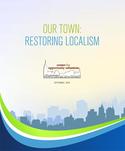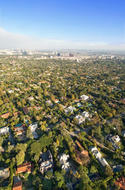As its economy started to recover in 2010, progressives began to hail California as a kind of Scandinavia on the Pacific — a place where liberal programs also produce prosperity. read more »
Urban Issues
California's Boom Is Poised To Go Bust -- And Liberals' Dream Of Scandinavia On The Pacific
Cities Need Connectivity in the Global Economy
My latest column is now online in the September issue of Governing magazine. It’s about the criticality of connectivity to success in the global economy. read more »
- Login to post comments
Our Town: Restoring Localism
This is an introduction to a new report from the Center for Opportunity Urbanism, "Our Town: Restoring Localism." Download the full report here.
America is facing a critical moment in its evolution, one that threatens both its future prosperity and the integrity of its institutions. Over the past several decades, government has become increasingly centralized, with power shifting from local communities to the federal level. This has been accompanied by a decline in non-governmental institutions, a matter of concern to thinkers on both the right and the left. read more »
- Login to post comments
The Evolving American Central Business District
After decades of serious economic decline, the inner cores in many of America’s largest metropolitan areas have experienced much improvement in recent years. This is indicated by the “City Sector Model,” (Image 9) which we developed to analyze the largest cities (metropolitan areas) using small functional areas, ZIP Code calculation areas (ZCTAs). read more »
- Login to post comments
What the Blues Brothers and Ferris Bueller’s Day Off Tell Us About Gentrification
The Blues Brothers and Ferris Bueller’s Day Off are two of the seminal films set in Chicago. Indeed, Chicago itself is a character in both films.
The films are radically different even though released only six years apart. There are many ways to slice this. Some have said that one is the South Side movie (The Blues Brothers) and the other the North Side movie (Ferris Bueller). Some see one as more urban, one more suburban. read more »
- Login to post comments
Is it Time for MagLev?
Maryland officials have announced that a proposal to build a maglev line from Washington to Baltimore has received a commitment for the feasibility study of $2 million from Japanese government. read more »
- Login to post comments
The Future of Mobility
I was walking home from downtown San Francisco and passed through the South of Market neighborhood. The area is full of tech company offices like Twitter, Uber, and Airbnb. I saw this minivan advertising, “Low Cost Commuting” and “Ride Share” with the Enterprise Rent-A-Car logo and thought hmmmmm. read more »
- Login to post comments
Jerry Brown’s Housing Hypocrisy
Jerry Brown worrying about the California housing crisis is akin to the French policeman played by Claude Rains in “Casablanca” being “shocked, shocked” about gambling at the bar where he himself collects his winnings.
Brown has long been at the forefront on drafting and enforcing regulations that make building housing both difficult and very expensive. And now he has pushed new legislation, which seems certain to be passed by the Legislature and signed by the governor, that makes it worse by imposing even more stringent regulations on greenhouse gas emissions, mandating a 40 percent cut from 1990 levels by 2030. read more »
- Login to post comments
The Perils of Public Capital
Most discussions of our slow economic growth includes a seemingly compulsory demand for increased public capital spending, so-called infrastructure spending or simply “roads and bridges.” Both Donald Trump and Hillary Clinton promise increased public capital spending on their websites. Larry Summers made perhaps the best case for public spending when he claimed that our failure to invest in public capital creates the “worst and most toxic debts.” read more »
- Login to post comments
Trump’s Pitch to Blacks
After Trump made a recent speech in Milwaukee in which he directly asked for black votes, I was asked to write a about it. My piece is now online in City Journal and is called “Trump’s Pitch to Blacks.” read more »
- Login to post comments






















